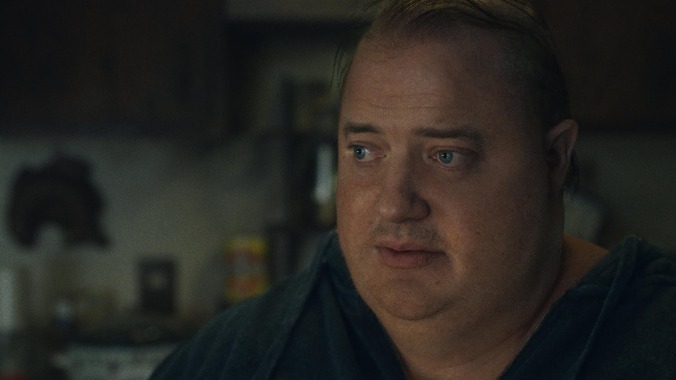The Whale review: Brendan Fraser does his best to elevate Darren Aronofsky's latest
It's easier to root for Fraser and his much-lauded comeback than it is to actually connect with Aronofsky's inconsistent film

One of the most compelling stories this awards season has been Brendan Fraser’s big-screen comeback. Nary a day goes by without a story about a standing ovation he received at some film festival or a magazine interview where he revealed something personal and poignant. Fraser was a major star in the late 1990s fronting a franchise—The Mummy movies—that enjoyed a cultural resurrection the last few years, attracting new audiences and making him a figure of fan adoration online. Many people are rooting for him to succeed and that sentiment has crystalized in hopes that he wins the best actor Oscar next March for his performance in Darren Aronofsky’s The Whale. The performance is so linked to this buzz that the film’s marketing department is emphasizing Fraser’s award prospects instead of elements of the film, which make it fair to mention this in a review of the film’s merits.
Ostensibly a character study of a man desperate to connect before time slips away from him, The Whale becomes an exercise in watching a slow suicide. Charlie (Fraser), afflicted by obesity, has mostly isolated himself from the world. The first scene of the film hits the audience in quick succession: masturbation, a heart attack, and a young missionary (Ty Simpkins) trying to save Charlie’s soul. Audiences who love Aronofsky’s penchant for putting his characters through both physical duress and holy enlightenment will appreciate this bold opening.
As the story develops we discover that Charlie is grieving the loss of a dead boyfriend. This heartbreak is the reason for the isolation. Yet despite all that, he remains a positive soul, believing in the good of people whether they also show him grace, like his best friend and caretaker, Liz (Hong Chau), or are cruel to him, like his estranged teenage daughter Ellie (Sadie Sink), whose mother has kept her from him since their divorce.
Aronofsky is interested in how much people can push themselves physically and use their bodies, not only to accomplish physical feats but also to reach emotional nirvana, themes he’s explored before in 2008’s The Wrestler and 2010’s Black Swan. In the first film, a way-past-his-prime professional wrestler played by Mickey Rourke continues to push his tired and withering body to the extreme. In the latter, Natalie Portman’s ballerina struggles to be perfect as both the black and the white swans of Tchaikovsky’s famous Swan Lake ballet, pushing her body to its maximum limits in the process. Considering how similar these plots sound to The Whale’s, you’d think that makes him the perfect filmmaker to adapt Samuel Hunter’s play.












![HBO teases new Euphoria, Larry David, and much more in 2026 sizzle reel [Updated]](https://img.pastemagazine.com/wp-content/avuploads/2025/12/12100344/MixCollage-12-Dec-2025-09-56-AM-9137.jpg)



























